Veterans Day 2021: Honoring our ND Law student veterans
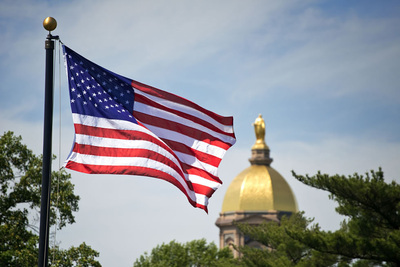
Notre Dame Law School is grateful for each of our students who have served or are currently serving our country through the U.S. Armed Forces.
Each has a unique path and story that has led them to law school, and to Notre Dame. Approximately 20 current students have served in one of the five branches of the military. Some students have retired from military service, while others remain active in reserve service. Some will continue to serve through the JAG Corps after graduation.
Our veteran students have enriched the Notre Dame Law School community through their dedication, commitment, leadership, and involvement throughout the Law School. ND Law is committed to assisting our veterans and their families by our continued support and participation with the Post-9/11 GI Bill Yellow Ribbon Program.
This Veterans Day we are honored to profile several of our veteran students and share their stories.
Mike Atkins, 3L
U.S. Coast Guard
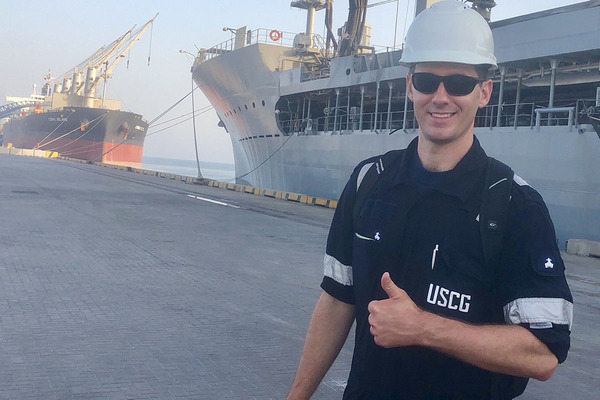
Mike Atkins is currently a lieutenant in the U.S. Coast Guard. He received his commission from Officer Candidate School in New London, Connecticut, in 2013. He was first stationed in Louisiana, where he was assistant chief of inspections at Marine Safety Unit Houma, an office responsible for regulating vessels engaged in the offshore oil and gas industry. He then spent three years as a journeyman marine inspector at U.S. Coast Guard Activities Europe, in Limburg, the Netherlands. He traveled about 130 days per year, leading statutory inspections of the U.S.-flagged deep-draft freight and tank vessels, offshore supply vessels, and construction barges. His awards include two Coast Guard Commendation Medals with Operational Distinguishing Device.
Atkins has wanted to serve in the military since childhood. His family history was an initial impetus to serve — his father fought in Vietnam, his grandfathers fought in World War II, and at least one great-grandfather fought in World War I.
“As I got older, I became drawn to the values of duty and discipline and, most importantly, service to one’s country. I also appreciate the structure and stability, the traditions and history, and, of course, the potential for adventure was alluring — to see the world, overcome challenges and achieve successes that are much more meaningful than personal plaudits,” said Atkins.
The work at his first duty station was intense, standing watches and studying arcane federal safety, security and environmental regulations, which he applied during inspections of vessels and port facilities. In Europe, he worked closely with the State Department and other agencies to gain clearance and ensure security in various countries, and with government officials in Africa and the Middle East to help implement international conventions related to port security.
He said these experiences helped prepare him for the demands of law school, academic and otherwise. Additionally, global travel imparted a deep appreciation and respect for cultures other than his own.
“I witnessed, firsthand, human suffering and extreme levels of poverty, gaining perspective on the frailty of life and the importance of functional government and institutions — invaluable insights in learning and, ultimately, applying the law,” he said.
While he wanted to go to law school for the intellectual challenge, he says more importantly for the chance to gain the requisite knowledge and skillset to do rewarding, positive work on the back end.
“I’m studying law at Notre Dame not just because it’s a top-tier program. What truly sets ND Law apart is the strong sense of community among faculty, staff and students, as well as the clear commitment to a higher purpose — that a career in law is more than just any career. It is a mission, a vocation, a means by which to effect positive change,” he said. “Also, the football games are a lot of fun.”
Atkins received his undergraduate degree from the University of Mississippi. After his first-year summer he worked at the Ninth Coast Guard District Legal Office in Cleveland, Ohio, where he assisted staff attorneys on issues arising on the Great Lakes. During his second-year summer he worked at the Coast Guard Legal Service Command in Norfolk, Virginia, focusing on criminal prosecutions. After law school, he will serve as a judge advocate working as a prosecutor, building and bringing cases under the Uniform Code of Military Justice.
Samantha Downey, 1L
U.S. Army
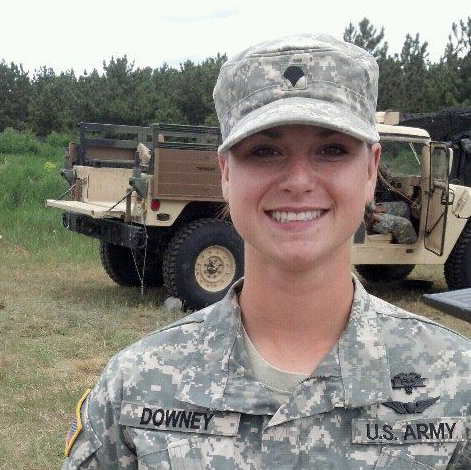
Samantha Downey joined the U.S. Army as a combat medic when she was 18 and left for basic training in 2009 after graduating from high school. She lived in South Korea for two years and served as a flight medic at Camp Humphreys, South Korea. She was the honor graduate for the Expert Field Medical Badge competition. She was deployed to Afghanistan in support of Operation Enduring Freedom. She left the military in 2016 as a staff sergeant so that she could finish her undergraduate degree at the University of Wisconsin-Green Bay and apply to law school.
“I always felt like the ‘black sheep’ growing up and that I didn’t quite belong in my hometown. Joining the military was a great way to get out into the world to try and find myself,” said Downey.
She says the experiences in the military very much shaped who she is today. “I had to grow up quickly and deal with situations that really made me appreciate life and all of the privileges and freedoms that I enjoy. Not only did I make some of my closest friends while in the Army, but I also found the love of my life during my service,” she said.
She has wanted to go to law school since she was a little girl. “I knew that I wanted to have a respected career that mattered and that made an impact in other people’s lives,” she said.
Downey has been awarded two scholarships since she started at ND Law. She received a Military Veteran Law Scholarship from Barnett Howard & Williams PLLC. She was also the recipient of the Fitch Law Firm Sexual Abuse Survivor Scholarship. In her scholarship essay she wrote about pursuing legal action against her assailant in a sexual assault that happened when she was in the miltary. She said that she “was able to find the silver lining by being inspired by the legal prosecution.”
Downey plans to pursue a law career in health law litigation and sexual assault victim advocacy.
Tim Hutchinson, 2L
U.S. Army
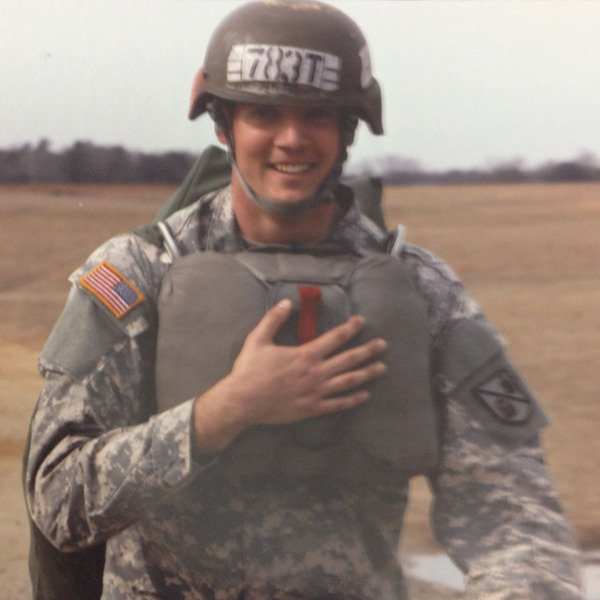
Tim Hutchinson enlisted in the U.S. Army as a cryptologic linguist in Arabic. He served active duty for a little over seven years as a paratrooper in Fort Bragg, North Carolina. He is now in the Army National Guard serving one weekend a month and two weeks a year.
“I joined because I did not want to live with regrets,” said Hutchinson. “Service is really important. The military teaches you that life is not all about you. You start to focus on your obligations to others. The whole experience made me into the man I am today. I accomplished things I never thought I could: physically, mentally, and emotionally. I got to travel all over the world, learn a new language, meet amazing people, help others, and jump out of planes. It was a great experience and I don’t regret a second of it.”
For Hutchinson, the military taught him many things. The word “soldier” is related to words like “solder” and “solidarity.” They all share the same proto Indo-European root akin to concepts like “whole,” “unified,” “one,” and “undivided.” The military taught him time management, self-discipline, and mental toughness. He said, “Most importantly, I walked away from all my experiences with a stronger sense of social solidarity. That is not a term we use in the military, but it is a good translation of the things we are taught and instilled with.”
As an example of this, Hutchinson said the first thing you do when you come to formation is fall in, look to right and left, and check on your brothers and sisters. And they do the same for you. “Everyone looks out for each other. Your life is about the whole group: the unit. You are soldiers; one, undivided, whole,” said Hutchinson.
Hutchinson says this mindset is even more crucial as a leader, that the purpose of the rank is to serve others under your authority. He had to be good at his job as a leader, and ensure his soldiers had everything they needed to be good at their jobs because that is beneficial for the whole unit. Now, as an aspiring legal professional, he says he needs to be a great lawyer so that he can better serve his clients.
“I need to write better legally, research better, network better, advocate better, keep improving, and never forget the fundamentals — not because I want glory or fame, but rather because I have an obligation to my client, to my family, and to my community to be the best I can be,” he said. “I need to remember to use my gifts and remember my obligations to them.”
Hutchinson says the University of Notre Dame motto, “God, Country, Notre Dame,” resonated with him and he sees how it is lived out on campus. The motto originally recognized the more than 2,200 Notre Dame men who fought in World War I and reflects the University’s longstanding commitment to and support of the military, veterans, and their families.
One of the first connections Hutchinson and his family made at Notre Dame was with Megan Leis, assistant director of the Office of Military & Veterans Affairs. Megan is married to fellow law student, Eric Leis.
“Megan and Eric have both been overly helpful with questions I had and took time to make sure my family and I got all the information we needed to move into South Bend. They really showed us that the Notre Dame community is different. That, and a million other little interactions on campus made all the difference in choosing to come to Notre Dame,” he said.
Hutchinson attended West Virginia University. He is part of the National Lawyers Guild, the Business Law Forum, and the Vis Moot Court. During his first-year summer he was a summer associate for Koley Jessen in Omaha, Nebraska.
Eric Leis, 3L
U.S. Navy
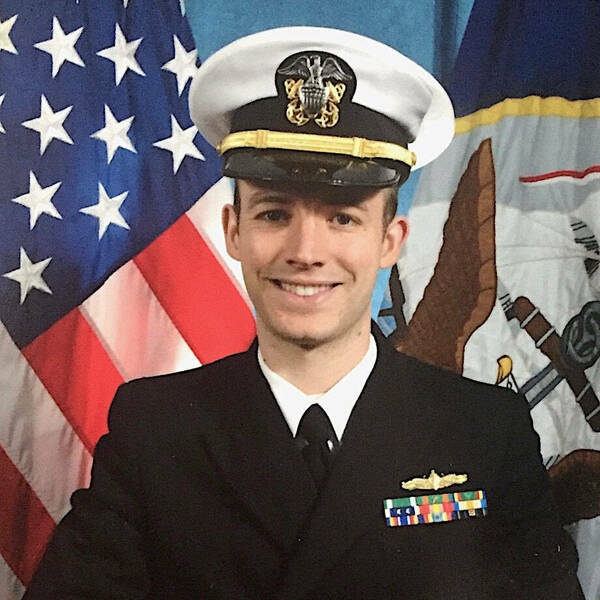
Eric Leis served on active duty for eight years in the U.S. Navy as a nuclear surface warfare officer. He first served as the Gunnery Officer on the USS Chung-Hoon (DDG 93), stationed in Pearl Harbor, Hawaii, where he deployed to the Western Pacific in support of international exercises and freedom of navigation operations. He then attended Nuclear Power School in Charleston, South Carolina, before reporting to the USS George H.W. Bush (CVN 77) in Norfolk, Virginia. On the George H.W. Bush, Leis served as the reactor electrical officer and assistant reactor training officer and deployed to the Persian Gulf in support of the global coalition against ISIS. Finally, Leis worked as the director of military training at Recruit Training Command, Great Lakes.
Leis is currently a Naval Reservist working for the Office of Naval Research where he assists with a cybersecurity training project at Notre Dame.
Leis decided to join the Navy, motivated by the attacks on 9/11 and inspired by a long family history of military service dating back to the Revolutionary War.
“After the attacks on 9/11, I knew that I had an obligation to represent my generation by serving in the latest conflicts,” said Leis.
Leis attended the University of Notre Dame as an undergraduate and decided to return for law school. “To quote Lou Holtz, ‘If you’ve been to Notre Dame, no explanation is necessary. If you haven’t been there, no explanation will suffice.’ None of the other law schools I visited could ever compare to Notre Dame,” he said.
Leis is the executive articles editor for the Journal on Emerging Technologies, the president of the Military and Veteran Law Society, and the founder of the Notre Dame Law School Running Club. He spent his first-year summer working as a research assistant for Professor Samuel Bray and his second-year summer as a summer associate at Barnes & Thornburg in South Bend. After graduation, Leis will be clerking for Judge David Porter, U.S. Court of Appeals for the Third Circuit in Pittsburgh.
Eric’s wife, Megan, is also a veteran and a Notre Dame alum. She is the assistant director of Notre Dame’s Office of Military & Veterans Affairs. They have one son, Jimmy, and a second son due in December.
Leis reflects on the burdens all veterans carry. “For many veterans, after they return home, the fight is just beginning. Many of them will carry physical and mental burdens for the rest of their lives. When the banners are taken down and the bands disperse, many veterans are left to wonder ‘what now?’ Veterans Day is our annual reminder to embrace those veterans and do what we can to help them adjust to civilian life,” said Leis.
Chris Majercin, 2L
U.S. Navy
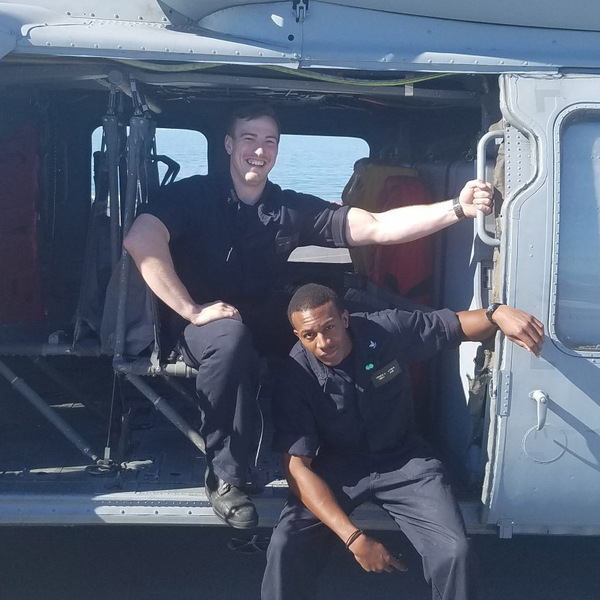
Chris Majercin served six years as a nuclear machinist mate in the U.S. Navy. He operated and performed mechanical maintenance on the nuclear reactors aboard his ship. He went through boot camp in Great Lakes, Illinois; Nuclear Power School in Charleston, South Carolina; Nuclear Prototype Training Unit in Ballston Spa, New York; and then was stationed aboard the USS Gerald R. Ford in both Newport News and Norfolk, Virginia. He was onboard for various building and testing milestones before the ship was commissioned. He was part of the crew for the ship's sea-trials period and became a plank owner. He spent a significant amount of time at sea performing various operational tests for the ship’s propulsion system and reactor. For his commendable performance, Majercin has been awarded two Navy-Marine Corps Achievement Medals.
Majercin grew up surrounded by a family of veterans, including grandparents, uncles, and great- grandparents. He says being around people that chose to enlist in the military because of their pride and loyalty in their country motivated him to serve. He was particularly inspired by his grandfather, who immigrated from Czechoslovakia, saying that he was proud to serve a country that gave his family a safe place to build a life during a period of turmoil in eastern Europe. Majercin, who is from Bridgeport, West Virginia, also points to the universal respect for character and selfless service aspect of military members that was prevalent in rural parts of the United States where he grew up.
“Between those two major influences in my life and the patriotism that was so pervasive after 9/11, I have wanted to serve from a relatively young age and finally took the plunge in 2013,” he said.
Majercin says his time in the military definitely redefined “hard work.”
“The military and, in particular, the nuclear field has a really low margin for error. This means being subject to constant scrutiny, with no room for excuses, around the clock everyday. Being surrounded by people who are living in that environment forces you to just keep going to prevent someone else from having to shoulder the load because the work has to get done,” he said.
Majercin felt compelled to take advantage of his veteran benefits to break into a professional field where he can help others and provide stability for his family. He says Notre Dame Law School felt like a good fit from the start. He felt a strong veteran presence on campus and has run into multiple sailors from his ship.
At the Law School he is involved in the Public Interest Law Forum and is on the Notre Dame Journal of Legislation. During his first-year summer he worked for the New York Attorney General Environmental Protection Bureau.
“I knew I wanted a school that would offer a great education, an intellectual environment, and an opportunity to return to the Midwest. Notre Dame provided that in a smaller town that was more affordable and more family friendly than several other schools I had the opportunity to attend,” he said.
Majercin says it is important to remember that the view people see of veterans on campuses such as Notre Dame is a privileged one and not the situation for many veterans.
“We are all very fortunate here to have been able to take advantage of our benefits and flourish in a supportive environment. Lots of veterans are unable to utilize all their benefits for various reasons and struggle with physical and mental ailments from their service. When coupled with the stress from the transition to the civilian world and the loss of the camaraderie of their fellow service members, they can find themselves in tough situations,” he said.
If the opportunity arises, Majercin says providing assistance to veterans in need is a great way to give back.
Jorge H. Ortiz, 3L
U.S. Army
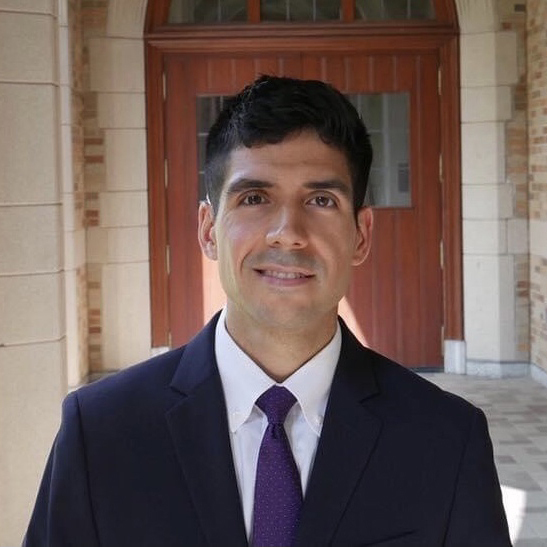
Jorge H. Ortiz enlisted in the U.S. Army in 2015 and did his basic combat training at Fort Benning, Georgia. After completing basic training, he entered Army Officer Candidate School and received his commission as a transportation officer in 2017. He then completed the Basic Officer Leader’s Course in Fort Lee, Virginia. Since then Ortiz has served in three battalions and three companies throughout Indiana as platoon leader, company executive officer, and acting company commander.
Ortiz comes from a family of first-generation immigrants. His gratitude toward the United States is what led him to enlist in the military.
“My family came to this country in search of a better life, and we have been fortunate enough to achieve that in the United States. Because of this, I have always had a desire to serve our country,” said Ortiz. “I can't think of a more meaningful way to serve than by doing so in uniform.”
He credits the military for giving him a strong sense of discipline and focus, along with mental toughness and resilience, all traits that have helped him throughout law school.
“The military also taught me how to work well and effectively with others from diverse backgrounds and walks of life in pursuit of a common objective,” he said.
One of Ortiz’s mentors was a lawyer who encouraged him to pursue a law degree, saying that the legal training would help him to think more analytically, reason more effectively, and think through complex problems more clearly; that this skill set would be useful whether he chose to practice law or not.
While at Notre Dame Law School, Ortiz has been involved in the Student Bar Association, Military and Veteran Law Society, Hispanic Law Students Association, and is an editor of the Journal on Emerging Technologies. He spent his first and second summers working at Barnes & Thornburg in South Bend. He will work as an associate in the government services and public finance department at Barnes & Thornburg after graduation.
Ortiz received his undergraduate degree from the University of Notre Dame. He said he decided to stay and pursue his legal education at Notre Dame because it is a premier, national law school that provides a top-tier legal education taught against a moral backdrop.
“At Notre Dame Law School we are asked not only whether a proposed action is legal, but also whether it is ‘right’ and furthers the cause of justice. Notre Dame encourages its law students to be a force for good in the world and that is an aspiration that has always guided my life, so this principle of the Law School resonated deeply with me,” said Ortiz.
Joshua Paldino, 2L
U.S. Army
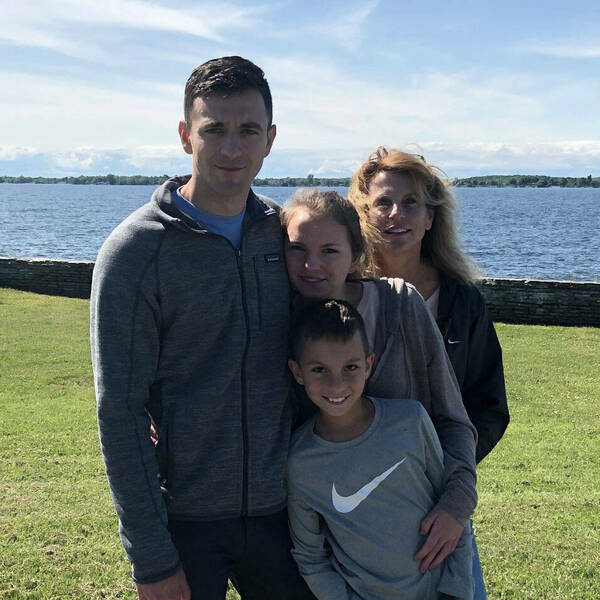
Joshua Paldino commissioned as an infantry officer into the U.S. Army after graduating from Washington and Lee University in 2015. He completed the Infantry Basic Officer Leader Course, Airborne School, and Ranger School at Fort Benning, Georgia. He was assigned to the 10th Mountain Division in Fort Drum, New York, served as a platoon leader and executive officer, and deployed to Afghanistan in support of Operation Freedom’s Sentinel.
“As an Army officer, particularly as an infantry officer, you’re given the incredible responsibility of leading and caring for soldiers. I knew this was an opportunity and privilege that I wanted to pursue, and the Army is one of the few places where it is possible,” said Paldino.
Upon returning to the U.S., he served as a platoon leader and operations officer in the 3D U.S. Infantry Regiment (The Old Guard). There, he led and conducted funerals and ceremonies at Arlington National Cemetery, the U.S. Capitol, and elsewhere throughout the National Capital Region.
During his time in The Old Guard, Paldino was selected for the U.S. Army's Funded Legal Education Program. As a law student in the program, he will spend three years as an active-duty captain and student at Notre Dame. Following graduation, he will continue to serve as a judge advocate in the U.S. Army JAG Corps.
“I can’t say exactly when I developed an interest in indigent defense, but I’ve known for some time that I want to be a public defender down the road. I also knew that I wasn’t ready to leave the Army just yet, so when I was selected for the Funded Legal Education Program, coming to law school was an easy decision,” he said.
He said while adjusting from a team-based environment in the Army to a more solo-driven endeavor in law school was difficult at times, his time in the military prepared him well.
“The challenges are certainly different, but my general approach has remained the same. Knowing that I’ve had to face and overcome challenging environments in the past enabled me to remain confident that I could succeed as a law student,” said Paldino.
Paldino knew he wanted to spend his three years of law school in a new part of the country, and the Midwest provided that. From there, he wanted a community that encouraged a free and honest flow of differing ideas, thoughts, and perspectives.
“Notre Dame is unparalleled in providing that, amidst a unique community in which students and professors care for one another,” Paldino said. “It certainly didn’t hurt that Notre Dame is home to the most iconic college football program in the country — one that (effectively) invented the sport as we know it today. Go Irish!”
Paldino is a staff editor for the Notre Dame Law Review. He spent his first-year summer as a Funded Legal Education Program intern in the office of the staff judge advocate for the U.S. Army Cadet Command.
Ryne Quinlan, 3L
U.S. Army
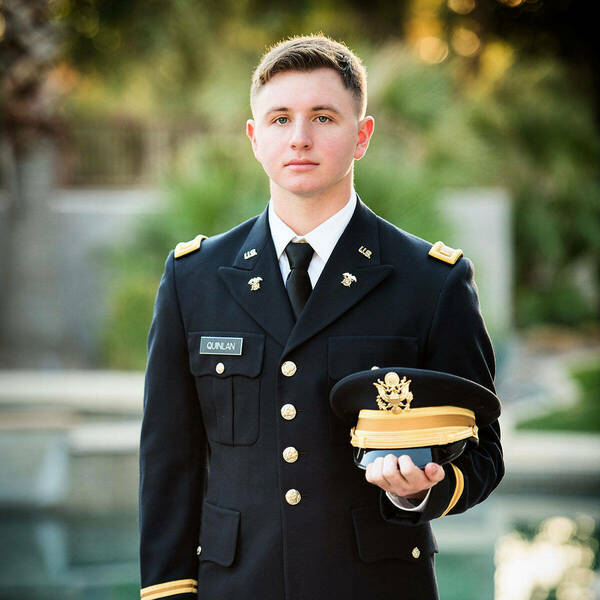
Ryne Quinlan is currently an officer in the Illinois Army National Guard. He originally enlisted in the U.S. Army in 2013 through the ROTC program while an undergraduate at the University of Notre Dame. He chose the Army because it offered a diverse career path that allowed him to commission as an officer into the reserves while still pursuing a civilian career.
“I decided to join the military because I was drawn to the discipline and service that is offered by the commitment to serve something greater than myself,” he said.
As a cadet in ROTC, he completed U.S. Army Airborne School where he learned to perform combat jumps out of moving airplanes and is a qualified paratrooper. After graduating from Notre Dame he received his commission as a second lieutenant. He has been a platoon leader, an executive officer, and now an operations officer with the 634th Brigade Support Battalion and the 108th Sustainment Brigade. He recently passed his promotion board for the rank of captain.
Before coming to law school, he earned a master’s degree in accounting from the University of Notre Dame and worked for Accenture in Chicago, while performing his military duties in the Army National Guard.
“I was drawn to law school from both observing the lawyers during my civilian career at Accenture, and from observing the judge advocate officers in my unit, the 108th Sustainment Brigade,” he said.
He is involved in ND Law’s Intellectual Property & Entrepreneurship Clinic and serves as an assistant rector in Knott Hall. During his first-year summer he was a research assistant for Professor Matthew Barrett, and during his second-year summer he served with the Army National Guard managing COVID-19 vaccine sites. He will work as an associate at McKinsey & Company in Chicago after graduation.
Since the onset of the COVID-19 pandemic he has been extremely busy with Army responsibilities. His National Guard unit has been called to assist with flood duty in Michigan, civil unrest in Chicago and Louisville, and the management of four COVID-19 vaccine sites across the state of Illinois.
“Between being a law student, an assistant rector in the dorms, and an officer in the Army, I am often pulled in many directions by my duties,” he said.
Ambris Saravanan, 3L
U.S. Army
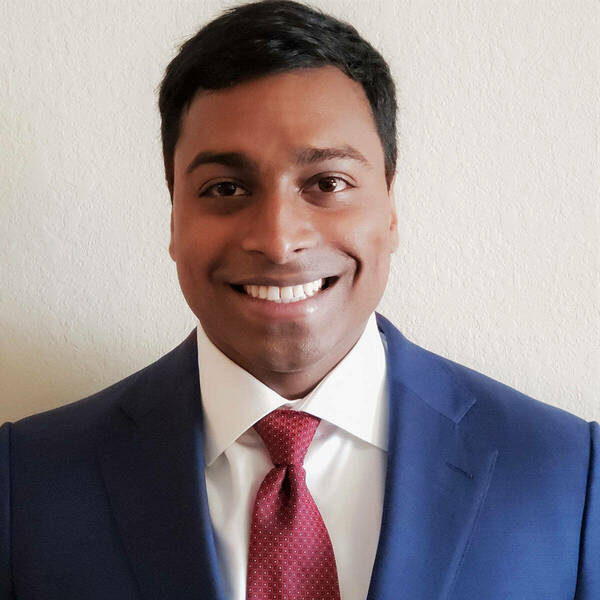
Ambris Saravanan served as an active-duty combat engineer in the U.S. Army for two years. He was assigned to the 87th Sapper Company, 20th Engineer Battalion, 36th Engineer Brigade in Fort Hood, Texas. His job responsibilities included military demolitions and mine clearance. He was medically retired from service following a parachuting accident.
“I chose to enlist in the military because I am a naturalized citizen and felt a strong sense of duty and interest in serving my adoptive country,” said Saravanan. He says he ultimately decided to enlist after taking an experiential learning course while an undergraduate at Loyola University in Chicago, where he helped a group of high school Junior ROTC cadets apply for college and seek mentors. Their instructor convinced him that enlisting would be the best way to serve.
“My time in the military showed me the value of being honest, hard working, and punctual,” he said. “I don't think I can ever not be 15 minutes early to every single class or meeting again!”
Saravanan has been involved in the Law School’s Moot Court trial and appellate teams and the Journal of Law, Ethics & Public Policy. During his first-year summer he was a judicial extern for Judge John R. Blakey ’88, ’92 J.D., U.S. District Court for the Northern District of Illinois, and during this second-year summer he worked both at Willkie, Farr & Gallagher in Chicago and at the Department of Justice Antitrust Division. He plans on practicing litigation in Chicago after graduation.
Michael Vinson, 1L
Kansas Air National Guard
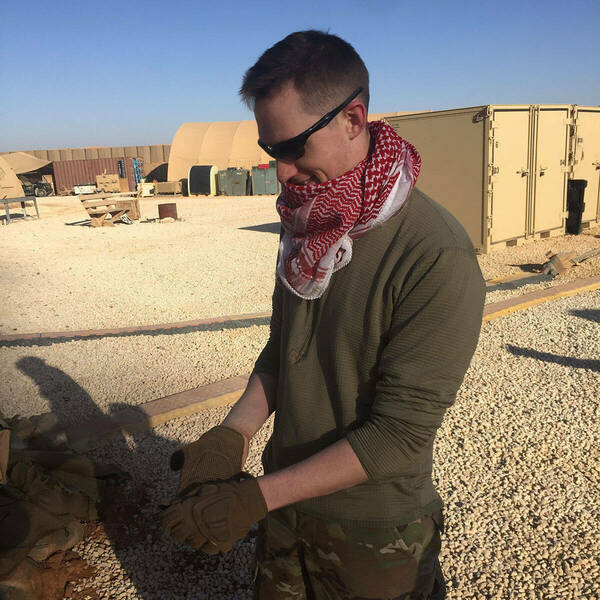
Michael Vinson joined the Kansas Air National Guard just before the end of high school. He was a traditional guardsman, working one weekend a month and two weeks in the summer, while attending college in Kansas. In 2015, Vinson was deployed to the United Arab Emirates for six months, where he identified aircrafts over Iraq, Syria, and Afghanistan. From 2016 to 2019, he returned to being a traditional guardsman and attended Wichita State University. In 2019, he volunteered for a deployment with the Oregon Air National Guard to Jordan, where he attenuated a radar system. He returned to the United Arab Emirates where he managed a team that remotely controlled sensors (radars and radios) placed throughout the theater. Following that deployment, he worked with his unit in Wichita until beginning law school.
Prior to joining the National Guard, Vinson had no intention of a career in the military, but with the large financial burden to attend college, his grandfather and mom encouraged him to see what the military was like by joining the Kansas Air National Guard. “The guard presented a good opportunity to grow and had the added benefit of paying for a good portion of my undergraduate education,” he said.
Vinson says he has never been one for long-term plans, and law school seemed like the “best next step” for his life. “Though I tell people I chose Notre Dame to separate myself from my peers trying to get back to the Wichita market, the truth is that no doors will close to me by attending Notre Dame. When I decided on Notre Dame I was making a decision to buy some time,” said Vinson.
When reflecting on his service, Vinson commented that the vast majority of military service members come from military families, and that this has exacerbated what many call the military-civilian gap. As this gap widens, the civilian population becomes less aware of what really goes on in the military, and military culture generally, leaving too much room for this gap to be filled by untrue stereotypes.
“The best way, and the only way, to understand what the military is about is to talk to veterans about what their time in the military was like,” said Vinson.
Brian Weskamp, 3L
U.S. Army
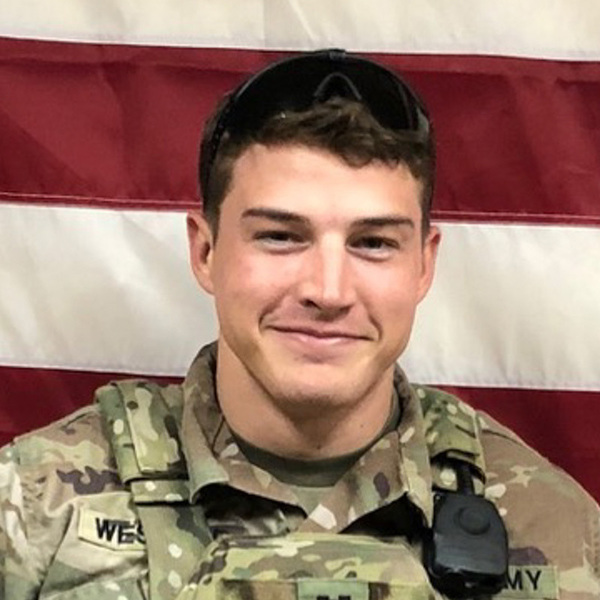
Brian Weskamp is an active duty captain in the U.S. Army. He received a commission from the Reserve Officer Training Corps as a 2nd lieutenant in the U.S. Army upon graduation from Fresno State University. His initial assignment in 2014 was with the 2nd Squadron, 16th Cavalry Regiment in Ft. Benning, Georgia. He graduated from Armor Officer Basic Course, Army Reconnaissance Course, Infantry Mortar Leaders Course, Airborne School, and Army Ranger School, where he earned a Ranger Tab.
In 2015, Weskamp and his wife, Leah, relocated to Ft. Campbell, Kentucky, where he served in the storied 101st Airborne Division (Air Assault). He was assigned to the 1st Brigade Combat Team (Bastogne) and served in numerous positions within the 1st Squadron 32nd Cavalry Regiment. He served as an assistant squadron operations officer in Headquarters Troop, a mounted reconnaissance platoon leader in Blackhorse Troop, and finally as an executive officer in a light Infantry Reconnaissance Troop. As an executive officer, Weskamp was responsible for the coordination and deployment of the Troop to north Africa where they trained Tunisian Airborne and Special Forces in light infantry maneuvers, combat medicine, and reconnaissance tactics preparing them for counter insurgency operations.
In 2018, Weskamp was hand-selected to serve as the aide-de-camp to Major General John W. Brennan, commanding general of the Train, Advise, Assist, Command-East. He was deployed to Afghanistan in support of Operations Freedom’s Sentinel and Resolute Support. As an aide-de-camp, Weskamp was personally involved in peace and reconciliation negotiations between the Taliban and the Afghan government. For his personal contributions in forwarding peace efforts in Kunar, Laghman, and Nangarhar Provinces of eastern Afghanistan, he received an award from senior government officials of Islamic Republic of Afghanistan.
Upon his redeployment back to the United States, he was accepted into the Army’s Funded Legal Education Program where he will continue his service in the Judge Advocate General’s Corps upon graduation from law school.
Weskamp says it was his childhood dream to be a student at Notre Dame.
“I chose Notre Dame because I truly believe in the mission statement of Notre Dame Law School and hope to continue my service as a ‘different kind of lawyer,’” he said.